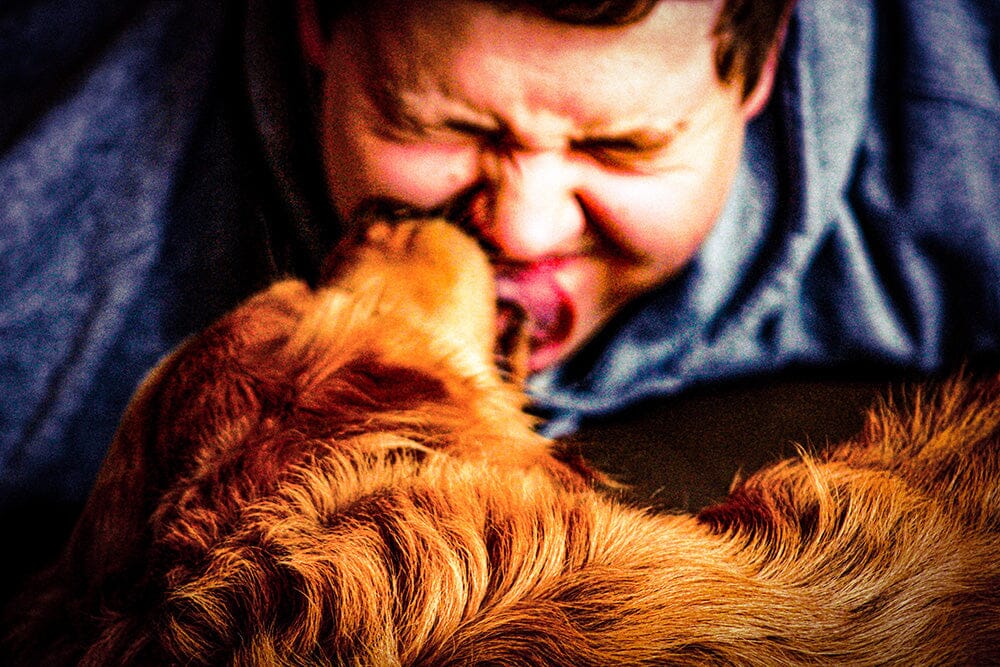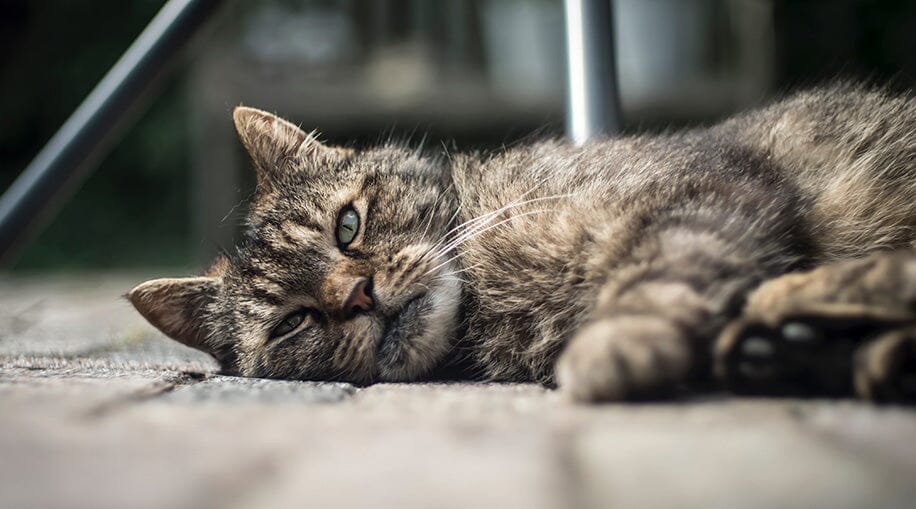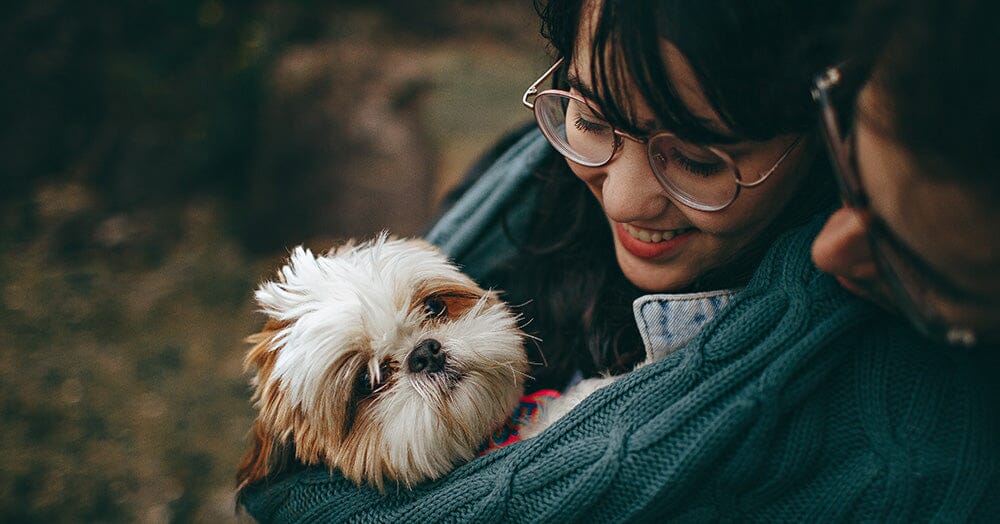Why Does My Dog's Breath Smell So Bad?
It's all sweet and cute when your dog gets excited, sticks their face in yours and greets you with a lick… UNTIL you smell their breath. Did something die in there?!
While it's normal for a dog's breath to have a slight odor, it should never smell like your furry friend is hiding dead fish, poop, or rotten food at the back of their mouth.
So it's natural to get worried when your dog's breath is stinky all of a sudden.
As quickly as you may have left to grab Febreeze, it's all up to you to find out the cause of stinky breath in your dog and do something about it. Even more than it being gross, you should be concerned about the possibility of your dog having an underlying health problem.
Typing "why do dogs have bad breath" in the Google search bar is what most dog owners do to get answers. As it turns out, there are several causes of bad breath in dogs, which makes things complicated, but the problem is more common than you'd think.
Let's dive in to explore what might be causing your furry baby's breath to stink and what you can do to get rid of it.
Causes of Bad Breath in Dogs
When humans suffer from bad breath, the culprit is usually something they ate (perhaps that garlic bread with dinner), or the morning-before-brushing-breath. For dogs, the cause is both similar and different (unless you shared your garlic bread with your dog) so it's worth digging in a bit more to find the real culprit.
There are a number of internal conditions that may be giving your dog bad breath, and it is best to identify these at their earliest. Bad breath in dogs can be a problem, but it can also be a very good diagnostic tool for vets.
Below we look at the 6 most common causes of bad breath in dogs.
1. Something Stuck in the Dog's Mouth
If your dog is an avid chewer, there's a good chance foreign material from their toys, ropes, or sticks is to blame for the bad breath. Sometimes, food debris gets stuck between the teeth, producing a nasty smell.
As the first line of remedy, you should take a good look at your dog's mouth to see if there are any threads stuck between the teeth or if a stick or a chew toy is wedged in the roof. Some materials like splinters may hide in the cheek or under the tongue where you can't see them easily.
Sometimes, bad breath may be accompanied by vomiting and food refusal when something is hooked under the tongue. Depending on what is in your dog's mouth and where it is stuck, you may or may not have to take your canine companion to the vet to get it out.
2. Poor Oral Hygiene or Dog Gum Disease
Keeping your dog's mouth clean is essential when grooming your dog at home. Poor oral hygiene is one of the most common causes of bad breath in dogs whose owners don't brush their teeth regularly.
Like in humans, plaque and tartar buildup in dogs causes stinky bacterial growth, which may eventually lead to gum disease. Tartar can also result in inflammation of the gums (gingivitis).
If left untreated, the chances of leftover food, grass, and other debris getting stuck between your dog's gum line continue to increase, contributing to bad breath.
In addition to gum inflammation, your dog may develop a dental infection or cavities.

Pus formation, tissue destruction, and tooth loss are also possible with too much plaque and tartar buildup. All these conditions can cause your furry baby's breath to smell terrible.
3. Eating Poop or Something Toxic
It's not uncommon for dogs to eat poop, rummage through garbage, or ingest small pieces of household objects or chew toys during a snacking spree. They do so out of plain curiosity, but the repercussions may be stinky. Not only does eating poop make your dog’s breath stink, but it also carries the risk of parasites and bacteria.
Sometimes, dogs end up consuming rancid or toxic plants that can cause a rotting smell in their mouth. Similarly, those who eat cigarettes may have a breath that smells like nicotine.
Your dog could've eaten anything they weren't supposed to—detecting the problem will help determine the right treatment.
4. Dietary Deficiencies
If you've started feeding your dog home-cooked food or a raw diet, it could have unwillingly disrupted the normal balance of bacteria in their mouth and gut, especially if prepared improperly or with the wrong ingredients. This imbalance often leads to Salmonella overgrowth in the gut in response to dietary deficiencies, ultimately contributing to stinky dog breath.
Another culprit could be all those extra treats or the human food your dog gets from well meaning friends or family members. Many of the foods given to dogs as treats are not really good for them so it's important to know what foods you can and which your should not feed your dog.
While changing from bad kibble (one containing meat meal, corn syrup, BHA/BHT and other artificial chemicals) to a healthier dog food or even raw food may be good for your dog, any change in the diet could result in a change in their gut bacteria, causing temporary bad breath.
5. Canine Illnesses That May Affect Dog Breath
Sometimes your dog's breath is not a result of something they ate or not having brushed their teeth; sometimes there is a bigger underlying medical issue:
Canine Diabetes
If you sense a hint of a fruity or sweet smell in your dog's breath, it may be a sign that they could have diabetes. While this condition can easily be treated, it often goes unnoticed giving the body enough time to start breaking down fat and producing ketones.
Apart from the sweet smell, a change in appetite, weight loss, increased thirst, and frequent urination are all symptoms of possible diabetes.

Liver or Kidney Disease
If you can't stand your dog's breath and notice their gums or eyes turning yellow, along with decreased appetite or even vomiting, their liver may not be in good shape. When this organ doesn't function properly, toxins start building in the body, which can show up as stinky breath.
Liver problems often signify a more serious health condition, so you should rush to the vet and get your furry baby checked immediately.
The same goes for a kidney problem. If your dog's breath smells like pee, consider it a warning sign and consult with the vet. Toxins called urea start accumulating in the blood when the kidneys go bad, adding a urine odor to a dog's breath. In serious cases, the urea buildup can cause mouth ulcers or dog stomatitis, which your vet should examine during a checkup.
6. Oral Tumors or Loose Teeth
Another reason for bad breath could be oral tumors or cancer. These problems are most often found in older animals. As the mass within the oral cavity grows, it can become infected, and your dog may even lose their tooth.
These problems are usually found in older animals, so puppies or adolescent dogs will likely not have this problem. However, any dog can lose or chip a tooth.
Dogs can end up losing a tooth from biting into a too hard tennis ball or chewing on their leash. A lost tooth can be repaired, but while the gums are red and inflamed the bacteria can also cause bad breath. In case of any serious oral problem, it is always best to have it checked by a dental vet.
How to Get Rid of Bad Breath in Dogs
Now that you know the answer to "why do dogs have bad breath?" you must be eager for a solution.
Luckily, there are some easy ways to get rid of stinky dog breath. Depending on your specific situation, you may have to focus on one or more of the following:

Brushing Your Dog's Teeth
Regular brushing with a canine toothpaste and toothbrush is key to maintaining good oral hygiene for your dog. Try to do it daily or as often as possible. This practice helps prevent the formation of plaque and tartar, keeping gums healthy and smelling fresh.
Giving Your Dog Dental Products and Treats
Sometimes, even regular brushing can't prevent plaque and tartar buildup in dogs, or your dog just won’t let you near their teeth.
That's why investing in dental products formulated to help keep your furry friend's mouth clean and healthy is a good idea.
For example, Oral Health for Dogs is a natural treatment for inflamed gums, gingivitis, oral infections, and fungal stomatitis. This product works wonders for preventing plaque and tartar buildup in dogs, and in turn preventing oral problems.
Additionally, you can get special dental treats or chews designed to remove tartar and promote a good canine dental health. The right products will keep your dog's teeth clean and also massage the the gums as your dog chews on them.

Just be sure to monitor your dog when giving them a treat or chew toy.
Scheduling a Dental Checkup with the Vet
A dental checkup helps rule out any other causes for stinky dog breath. In addition, regular checkups can catch any potential health issues before they get bad enough to make you hold your nose.
If your dog's breath is particularly bad, but he's eating and acting fine, you should consider scheduling a dental exam right away. The vet will examine their mouth for signs of oral disease or infection. They may suggest getting a dental cleaning for your dog or removing any loose or damaged teeth based on what they see.
Limiting Access to Unpleasant Items When Outdoors
If you have a cat at home, consider placing the litter box outside your dog's reach. Also, clean up immediately after your dog poops to prevent consumption of feces.
You should also try to keep your furry baby away from non-food and potentially toxic items when you're out and about. Keep them on a leash and under your supervision to ensure they don't eat anything that could cause bad breath.
Changing Your Dog's Diet
If you suspect a dietary deficiency in your dog, consider reaching out to a canine nutritionist for a safe and healthy diet. You can also inquire about dental diets that scrape the teeth and reduce plaque buildup.
Treating Underlying Health Problems
If your dog's bad breath is caused by diabetes, liver problem, or kidney disease, you must seek treatment from a vet immediately. Once the underlying health issue is resolved, the stinky smell will go away too.
Final Thoughts on How to Get Rid of Stinky Dog Breath
While bad dog breath isn't necessarily a sign of a dangerous health condition, it could indicate or lead to a more serious problem if not identified and taken care of. If your dog's breath smells particularly bad, schedule a visit to the vet to check their dental and overall health and ensure there isn't an underlying medical issue causing the odor.
Apart from that, brushing your dog's teeth on a regular basis, using natural pills for dog oral health, and providing them with dental-specific chew toys and treats are great ways to reduce plaque buildup and bacteria growth.
For more tips on improving canine health, check out our other dog health blogs. You can also reach out to us to discuss our oral health product and what you can use to help your dog feel better.



